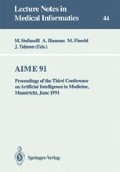Abstract
At present there are several different approaches to the problem of knowledge acquisition for Knowledge-Based Systems. This paper describes a comparative evaluation of three approaches, applied to the same medical domain: diagnosing chest pain. The first approach is what we call the ’compiled knowledge acquisition approach’, the second is ’machine induction’, the third ’knowledge structuring’. For each approach a version was designed that uses a set of cases diagnosed by experts as reference. The resulting knowledge bases were compared in terms of problem solving performance, the quality of the knowledge base and the effort spent on knowledge acquisition. Performance was also compared with human experts.
Access this chapter
Tax calculation will be finalised at checkout
Purchases are for personal use only
Preview
Unable to display preview. Download preview PDF.
References
B. Porter R. Bareiss and C. Wier. Protos–an exemplar based learning apprentice. Int. J. Man-Machine Studies, 29: 549–561, 1988.
J. A. Breuker and B. J. Wielinga. Model Driven Knowledge Acquisition. In P. Guida and G. Tasso, editors, Topics in the Design of Expert Systems, pages 265–296, Amsterdam, 1989. North Holland.
B.G. Buchanan and E.H. Shortliffe. Rulebased Expert Systems: The Mycin Experiments of the Stanford Heuristic Programming Project. Addison Wesley, Reading, Massachusetts, 1984.
Clancey, 1983] W.J. Clancey. The epistemology of a rule based system –a framework for explanation. Artificial Intelligence,20:215251, 1983. Also: Stanford Heuristic Programming Project, Memo HPP-81–17, November 1981, also numbered STANCS-81–896.
D. A. Evans and V. L. Patel. Cognitive Science in Medicine. MIT Press, Cambridge, Massachusets, 1989.
A. Ginsberg. Refinement of Expert System Knowledge Bases: A Metalinguistic Frame Work for Heuristic Analysis. Pitman, 1988.
J. Hong, I. Mozetic, and R.S. Michalski. Aq15: incremental learning of attribute-based descriptions from expamples, the method and user’s guide. Technical report, Department of Computer Science, University of Illinois, Urbana-Champaign, 1986.
R.S. Michalski. A theory and methodology of inductive learning. In R.S. Michalski, J.G. Carbonell, and T.M. Mitchell, editors, Machine learning: an Artificial Intelligence Approach. Springer-Verlag, 1983.
R. Neches, W.R. Swartout, and J.D. Moore. Enhanced maintenance and explanation of expert systems through explicit models of their development. IEEE Trans. Softw. Eng., 11: 1337–1351, 1985.
V. L. Patel, D. A. Evans, and D. R. Kaufman A cognitive framework for doctor-patient interaction. In D. A. Evans and V. L. Patel, editors, Cognitive Science in Medicine, pages 257–312. MIT Press, 1989.
J.R. Quinlan. Learning efficient classification, procedures and their application to chess end games. In R.S. Michalski, J.G. Carbonell, and T.M. Mitchell, editors, Machine learning: An Artificial Intelligence Approach, chapter 15. Tioga, Palo Alto, CA, 1983.
N. Shadbolt and B.J. Wielinga. Knowledge based knowledge acquisition: the next generation of support tools. In B. J. Wielinga, J. Boose, B. Gaines, G. Schreiber, and M.W. van Someren, editors, Current trends in knowledge acquisition, pages 313–338. IOS Press, 1990.
M. W. van Someren, L. L. Zheng, and W. Post. Cases, models or compiled knowledge? - a comparative analysis and proposed integration. In B. J. Wielinga, J. Boose, B. Gaines, G. Schreiber, and M.W. van Someren, editors, Current trends in knowledge acquisition, pages 339–355. IOS Press, 1990.
Author information
Authors and Affiliations
Editor information
Editors and Affiliations
Rights and permissions
Copyright information
© 1991 Springer-Verlag Berlin Heidelberg
About this paper
Cite this paper
Post, W., van Someren, M.W. (1991). A comparative evaluation of three approaches to the acquisition of medical knowledge. In: Stefanelli, M., Hasman, A., Fieschi, M., Talmon, J. (eds) AIME 91. Lecture Notes in Medical Informatics, vol 44. Springer, Berlin, Heidelberg. https://doi.org/10.1007/978-3-642-48650-0_21
Download citation
DOI: https://doi.org/10.1007/978-3-642-48650-0_21
Publisher Name: Springer, Berlin, Heidelberg
Print ISBN: 978-3-540-54144-8
Online ISBN: 978-3-642-48650-0
eBook Packages: Springer Book Archive

